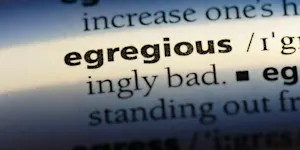What Makes This Word Tick
"Judicious" is one of those words that suggests a calm, wise decision—the kind we all hope to make amid life's little complexities. While its roots lie in legal discourse, as you might expect given its similarity to "judge," it's now commonly used to describe anyone making thoughtful, well-considered choices.
If Judicious Were a Person…
Picture someone with glasses perched on the edge of their nose, thoughtfully analyzing their list in the grocery aisle. This person ponders every item with care, just like a judicious thinker weighs all the facts before coming to a decision. They're not impulsive, and they probably start every day with a crossword and a cup of tea.
How This Word Has Changed Over Time
Originally tethered closely to legal judgments, "judicious" has broadened its horizons. What was once primarily about judges considering cases has expanded to include everyday decision-making, whether choosing the right route on a road trip or the perfect gift for a dear friend.
Old Sayings and Proverbs That Use Judicious
While the exact word "judicious" isn't rampant in proverbs, the sentiment definitely is. Consider the timeless advice: "Measure twice, cut once." It's all about taking a thoughtful, careful approach—an embodiment of the judicious mindset.
Surprising Facts About Judicious
You might expect a barrister or a professor to be described as judicious, but did you know it popularized in wider usage during the 17th century? It was a period of great intellectual exploration, which seems quite fitting.
Out and About With This Word
Next time you're considering your meal choices at a restaurant, try using "judicious" to describe your thoughtfully chosen dish. "I took a judicious approach and opted for the grilled salmon." It sounds impressive and might just earn you a knowing nod from the server!
Pop Culture Moments Where Judicious Was Used
In many a detective show or movie, you'll likely hear the protagonist praised for their "judicious" use of clues. Writers love to showcase astute characters this way, suggesting a level-headedness that helps crack the case.
The Word in Literature
Authors love sprinkling "judicious" into character descriptions, especially in classic novels. It pops up in narratives involving decision-making or wisdom, often applied to mentors or sagacious characters guiding the hero.
Moments in History with Judicious
Think of Franklin D. Roosevelt during the Great Depression. His careful balancing and methodical strategies to revive the American economy could easily be described today as judicious—making choices that were as wise as they were necessary.
This Word Around the World
While "judicious" translates directly into several languages, the concept is universal. In Japan, for example, the idea of a "kohdai" decision signifies grandeur and wisdom, resonating with what we think of as judicious choices.
Where Does It Come From?
The word "judicious" stems from the Latin “iudicium,” which means judgment. It journeys from the realm of Roman law into English dictionaries, carrying with it centuries of legalistic wisdom.
How People Misuse This Word
Some folks mistakenly use "judicious" when they mean "judicial," the latter relating specifically to judges or courts. While related, using the wrong one could raise a few eyebrows in a debate about legal reform.
Words It’s Often Confused With
Judicial: Related more to courts and legal systems than wise decision-making.
Prudent: Also implies wisdom, but with a financial or cautious twist.
Sagacious: Signifies wisdom but often used to suggest insight or foresight.
Additional Synonyms and Antonyms
Synonyms for "judicious" include wise, prudent, and astute. On the flip side, antonyms would be rash, imprudent, and foolish—none of which you’d want to describe your decision-making style!
Want to Try It Out in a Sentence?
Next time you’re at an auction or a meeting, say, “I’m making a judicious decision here,” and watch how people suddenly view your choice with newfound respect. It's all in the delivery!
















